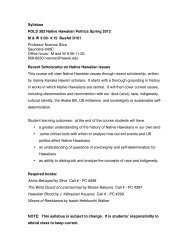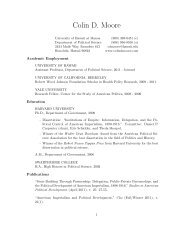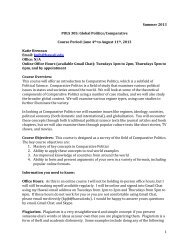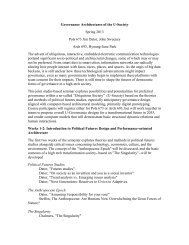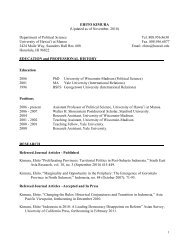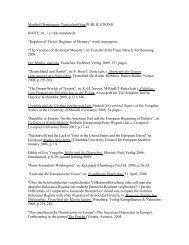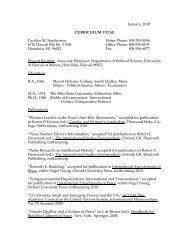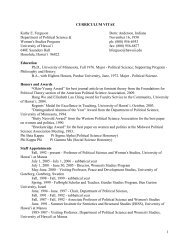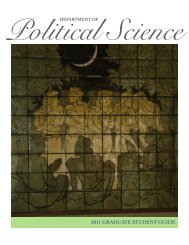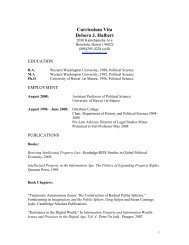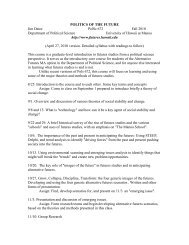Fall 2012 POLS 301 Syllabus [PDF] - Department of Political Science
Fall 2012 POLS 301 Syllabus [PDF] - Department of Political Science
Fall 2012 POLS 301 Syllabus [PDF] - Department of Political Science
You also want an ePaper? Increase the reach of your titles
YUMPU automatically turns print PDFs into web optimized ePapers that Google loves.
Pr<strong>of</strong>. Noelani Goodyear-Kaʻōpua<br />
Office hours: Thurs 12:30 – 2:30pm<br />
goodyear@hawaii.edu Saunders 609<br />
Hawaiʻi Politics (<strong>POLS</strong> <strong>301</strong>)<br />
<strong>Fall</strong> <strong>2012</strong>: T/Th 3:00 – 4:15pm in Webster 101<br />
Course Description<br />
This course in Hawaiʻi politics focuses on major institutions that have shaped island life<br />
over the last two centuries. Throughout the course, we will investigate the<br />
intersectionalities <strong>of</strong> power that operate through the various institutions we engage.<br />
This strong grounding in historical context provides class participants with a foundation<br />
for developing their own analyses on contemporary issues. The course is grounded in<br />
Native Hawaiian perspectives, but it draws on a range <strong>of</strong> voices and emphasizes<br />
constructive dialogue between indigenous and settler perspectives. Our understanding<br />
<strong>of</strong> Hawai’i Politics is further deepened by comparison with parallel issues and<br />
phenomena in the wider Oceania (Pacific Islands) region. This semester, we focus<br />
particularly on government, education, land, water, energy, food, race and class. You<br />
will investigate driving questions, including:<br />
• What have governments in Hawai’i, both legal and illegal, looked like over the<br />
past two centuries? How might one participate or intervene in the current<br />
governmental apparatus?<br />
• How have the lands, waters and other natural resources <strong>of</strong> our islands been used<br />
and changed under different regimes?<br />
• How have educational systems worked to create particular social and political<br />
orders in Hawai’i?<br />
• What influence have peoples’ movements had on shaping the social and political<br />
contours <strong>of</strong> island life?<br />
• What work has race done in shaping the social and political dynamics <strong>of</strong> the<br />
islands? How have racial formations, racism and imperialism in Hawai’i<br />
connected to and differed from other places in the Pacific?<br />
If politics can be broadly understood as the ways collective decisions are made and<br />
implemented, the form <strong>of</strong> the course mirrors the content <strong>of</strong> what we are learning. This is<br />
a project-based course, meaning that it is organized around the completion <strong>of</strong><br />
collaborative projects. In this class, you will get lots <strong>of</strong> practice working in groups to<br />
gather and analyze information, debate, make decisions, design plans and reflect on<br />
your work together.<br />
Learning Objectives<br />
By the end <strong>of</strong> this course, you will:<br />
1. Develop informed opinions about important political issues related to education,<br />
energy, and other current issues in Hawaiʻi today.<br />
2. Increase your understanding <strong>of</strong> Kanaka Maoli (Native Hawaiian) histories,<br />
experiences and perspectives on various political issues.<br />
3. Practice critical reading, research and public comment on government and media<br />
documents.<br />
4. Strengthen your ability to meaningfully participate and intervene in existing<br />
political institutions.<br />
5. Deepen your understanding <strong>of</strong> fundamental political concepts as they relate to<br />
politics in Hawaiʻi.<br />
6. Connect the course content to previous experiences and future commitments in<br />
your life.<br />
7. Reflect on your on-going responsibilities and passions for this place, Hawaiʻi nei.<br />
1
Pr<strong>of</strong>. Noelani Goodyear-Kaʻōpua<br />
Office hours: Thurs 12:30 – 2:30pm<br />
goodyear@hawaii.edu Saunders 609<br />
Textbooks<br />
• Fighting in Paradise: Labor Unions, Racism, and Communists in the Making <strong>of</strong><br />
Modern Hawaii, Gerald Horne<br />
• Haoles in Hawai‘i, Judy Rohrer<br />
• The Value <strong>of</strong> Hawaiʻi: Knowing the Past, Shaping the Future, Craig Howes and<br />
Jon Osorio<br />
• Waves <strong>of</strong> Resistance: Surfing and History in Twentieth-Century Hawaii, Isaac<br />
Helekunihi Walker<br />
Additional course readings must be downloaded from Laulima.<br />
Go to the <strong>POLS</strong> <strong>301</strong> tab, then click “resources.”<br />
Assignments and Grading<br />
This is a project-based course, and as such, the bulk <strong>of</strong> your grade will be earned<br />
through the completion <strong>of</strong> group projects—both collaborative and competitive—that<br />
provide an anchor for and culmination <strong>of</strong> your learning during the various units <strong>of</strong> our<br />
course. You will participate in at least one practice debate, as well as complete the three<br />
collaborative projects. While the debates help you develop your skills in argumentation,<br />
critical listening and confrontation, the other projects help you to develop your skills in<br />
collaborative problem-solving and creation.<br />
14% In-class debate (25 pts possible)<br />
Throughout the semester, four “in-class debates” are scheduled. You will sign up<br />
in groups <strong>of</strong> four participants for one debate. In other words, you only need to<br />
select one issue that you would like to debate, and these issues are briefly<br />
outlined in the schedule below. The format <strong>of</strong> the debates will be discussed in<br />
class. These in-class debates will give you practice for the final debate in which<br />
you will participate.<br />
43% Collaborative group projects (3 x 25 pts each = 75 pts)<br />
As part <strong>of</strong> the units on education, race/class, and energy/food, you will be completing<br />
group projects that are explained in “Project Briefs” (like an assignment sheet). Each<br />
Project Brief outlines the expectations for the unit project, giving you an overview,<br />
guidelines and the driving question for the project. The PBs will be handed out and<br />
explained in class, as well as available on Laulima. Projects are due on the dates noted in<br />
the course schedule. Unless you have gotten prior approval from me, you must be<br />
present in class to earn credit for the project since we will be sharing the projects, and<br />
this hōʻike, or sharing <strong>of</strong> your knowledge, is essential to the evaluation and grading <strong>of</strong><br />
the unit project.<br />
29% Final project (50 pts possible)<br />
The intention <strong>of</strong> the final project is for you to deepen and extend something that you<br />
have worked on or thought about during in the semester. You and your classmates will<br />
have attacked several different issues or problems. Your culminating project for the class<br />
can build on one <strong>of</strong> the unit projects you have completed throughout the semester, or<br />
you can elect to take on an issue that we have not had time to discuss fully in during the<br />
semester. You and your group will select one <strong>of</strong> the two options described below.<br />
2
Pr<strong>of</strong>. Noelani Goodyear-Kaʻōpua<br />
Office hours: Thurs 12:30 – 2:30pm<br />
goodyear@hawaii.edu Saunders 609<br />
Option A, Debate: In groups <strong>of</strong> four, you will formally debate a proposition that we (your<br />
group and I) agree upon together. Like the in-class debates, the proposition will be a<br />
clearly-worded sentence relating to a timely and contentious issue in contemporary<br />
Hawaiʻi politics. The debate will be judged by your classmates and a panel that will<br />
include community leaders, pr<strong>of</strong>essionals and possibly other UH pr<strong>of</strong>essors. Your group<br />
can chose to conduct your research together as a foursome or in your separate pairs that<br />
will argue against one another. In either case, you must be prepared to provide<br />
documentation <strong>of</strong> your factual evidence to your opponents or to the judges. You will be<br />
graded on: the quality <strong>of</strong> your research, the strength <strong>of</strong> your arguments, the efficacy <strong>of</strong><br />
your presentation, and the usage <strong>of</strong> critical listening as observed through your notes. In<br />
addition to the actual debate, you will each submit a 2-page issue brief, which includes:<br />
key terms, your key sources, and an outline <strong>of</strong> your case.<br />
Option B, Organize a public debate or discussion forum:<br />
Your small group (not more than four) will organize a public debate somewhere on the<br />
UH campus to help build awareness and generate discussion around a timely and<br />
contentious issue in contemporary Hawaiʻi politics. Some ideas include the proposed<br />
Oʻahu Rail system, the Native Hawaiian Roll/Kanaʻiolowalu, or the expansion <strong>of</strong><br />
military usage <strong>of</strong> lands. This assignment involves securing a venue on campus; securing<br />
speakers/participants who have some expertise and a clear position on your selected<br />
issue; publicizing your event; and facilitating the debate. You will be graded on your<br />
ability to pull the logistics <strong>of</strong> the event together, to frame the debate and provide<br />
context, to skillfully facilitate a productive discussion and to appropriately care for the<br />
speakers who will volunteer their time to participate. In addition to the actual event,<br />
your group will submit: 1) a bio on each speaker and explanation <strong>of</strong> why you chose this<br />
person to participate in the debate; 2) a 2-page issue brief that includes: key terms, key<br />
sources, and a short list <strong>of</strong> important assertions and supporting facts for both the<br />
affirmative and negative sides.<br />
14% Final Assessment (25 pts possible)<br />
At the end <strong>of</strong> the semester, you will complete an individual, in-class essay assessment on<br />
learning throughout the semester.<br />
Grading scale for the course:<br />
97-100% = A+<br />
94-96% = A<br />
90-93% = A-<br />
87-89% = B+<br />
84-86% = B<br />
80-83% = B-<br />
77-79% = C+<br />
74-76% = C<br />
70-73% = C-<br />
67-69% = D+<br />
64-66% = D<br />
60-63% = D-<br />
Pr<strong>of</strong>. Noelani Goodyear-Kaʻōpua<br />
Office hours: Thurs 12:30 – 2:30pm<br />
goodyear@hawaii.edu Saunders 609<br />
• I am learning the technological capacities <strong>of</strong> the room along with you, so please<br />
feel free to suggest ways that we might maximize our usage <strong>of</strong> these new tools to<br />
enhance learning.<br />
• In order to keep the room functioning at its optimum capacity, we must ask you<br />
to limit food and drinks in the room. There should liquid (including containers<br />
filled with c<strong>of</strong>fee, water or other beverages) on the tables at any time.<br />
Attendance and Tardies: Students should be in class, on-time. Whether tardy or absent,<br />
you may only make-up in-class assignments or exams if you get approval for alternate<br />
arrangements ahead <strong>of</strong> time. Students with excessive tardies will receive a warning and<br />
subsequently may receive a deduction in points from the final grade.<br />
Late Work: If students have special circumstances that prevent them from turning an<br />
assignment in on time PRIOR arrangements must be made. Otherwise, late work will be<br />
marked down by 10% for every day past the deadline. Assignments over a week late<br />
will not be accepted, unless we have made special arrangements ahead <strong>of</strong> time.<br />
Submission <strong>of</strong> work: All assignments must be submitted in hard copy in class. You<br />
may not submit work by email unless given specific instructions or received prior<br />
approval to do so.<br />
Academic Integrity: The work you do in this course must be your own. Yet, you will<br />
build on, react to, criticize, and analyze the ideas <strong>of</strong> others. This means you must be<br />
aware when you are working with someone else's ideas or research and explicitly<br />
acknowledge them in your writing, presentations, and other assignments. If you ever<br />
have questions about drawing the line between others' work and your own, ask your<br />
kumu and we will give you clear guidance. It is the studentʻs responsibility to be aware<br />
<strong>of</strong> and in compliance with the university’s policies regarding academic dishonesty. (see<br />
the UH catalog, link: http://www.catalog.hawaii.edu/about-uh/campuspolicies1.htm).<br />
Any academic dishonesty—such as plagiarism—will result in failure <strong>of</strong><br />
the course.<br />
Plagiarism is taking another person’s words or ideas without crediting them. Anything cut and<br />
pasted from a website without quotation marks and proper citation is plagiarism. Copying<br />
anything from a book or journal without proper citation is plagiarism. Plagiarism is academic<br />
theft, and there is no excuse for it. A student who submits assignments with plagiarized parts<br />
will receive an ʻFʻ for the course, no discussion. The case may also be referred to the Dean or<br />
department chair.<br />
Plagiarism usually occurs when students feel overwhelmed—by school, by finances, by illness,<br />
relationship problems, etc. If you are dealing with a situation like this, please let me know and we<br />
can work something out that will be much more positive than cheating. If you are unsure about<br />
how to properly use and credit sources, ask me for advice. You can also consult numerous online<br />
sources that provide tips on academic writing.<br />
Reasonable Accommodation Policy: If you feel you need reasonable accommodations<br />
because <strong>of</strong> the impact <strong>of</strong> a disability, please 1) contact the KOKUA Program (V/T) at<br />
956-7511 or 956-7612 in room 013 <strong>of</strong> QLCSS; 2) speak with the instructors privately to<br />
discuss your specific needs. We are happy to work with you and the KOKUA Program<br />
to meet your access needs.<br />
Schedule<br />
4
Pr<strong>of</strong>. Noelani Goodyear-Kaʻōpua<br />
Office hours: Thurs 12:30 – 2:30pm<br />
goodyear@hawaii.edu Saunders 609<br />
DATE TOPICS READINGS<br />
HISTORIES: Introduction and overview; Learning<br />
sovereignty and to see traces <strong>of</strong> Hawai‘i’s pasts in the<br />
government politics <strong>of</strong> the present<br />
T Aug 21<br />
R Aug 23 The Hawaiian Kingdom Government Silva, “Early Struggles with<br />
Foreigners”<br />
T Aug 28<br />
US Occupation and Territorial<br />
Government<br />
Sai, Keanu, “United States<br />
Seizure <strong>of</strong> the Hawaiian<br />
R Aug 30<br />
T Sep 4<br />
RACE, CLASS &<br />
SOCIAL<br />
MOVEMENT<br />
R Sep 6<br />
T Sep 11<br />
Hawaiian social movements and<br />
institutions: Da Hui, da Renaissance<br />
and da Roll<br />
In-class debate #1: Hawaiʻi: Fiftieth<br />
State or Occupied Country?<br />
The Role <strong>of</strong> Progressive <strong>Political</strong><br />
Thought and Activism in Hawaiʻi<br />
Project brief #1<br />
The Role <strong>of</strong> Progressive <strong>Political</strong><br />
Thought and Activism in Hawaiʻi<br />
Islands”<br />
Waves <strong>of</strong> Resistance: Surfing and<br />
History in Twentieth-Century<br />
Hawaii<br />
Waves <strong>of</strong> Resistance: Surfing and<br />
History in Twentieth-Century<br />
Hawaii<br />
Fighting in Paradise: Labor<br />
Unions, Racism, and<br />
Communists in the Making <strong>of</strong><br />
Modern Hawaii<br />
Fighting in Paradise<br />
R Sep 13<br />
Reflections on race, identity and<br />
kuleana<br />
Rohrer, Haoles in Hawai‘i, p.<br />
1-57<br />
T Sep 18<br />
In-class debate #2: “Haole” is not a<br />
racist term.<br />
Rohrer, Haoles in Hawai‘i,<br />
p.58-104<br />
R Sep 20 Project #1 due Additional readings relevant to<br />
your project<br />
EDUCATION<br />
T Sep 25<br />
Education in the Hawaiian Kingdom<br />
Project brief #2<br />
*Classroom observation by CTE<br />
“Hawai‘i: No Longer for the<br />
Native Hawaiian,” Ch 3<br />
from Culture and Educational<br />
Policy by Benham and Heck<br />
R Sep 27<br />
T Oct 2<br />
Building an American Territory<br />
through schools<br />
Small Group Instructional Diagnosis by<br />
the Center for Teaching Excellence<br />
Beyer, “The Connection <strong>of</strong><br />
Samuel Chapman<br />
Armstrong as Both<br />
Borrower and<br />
Architect <strong>of</strong> Education in<br />
Hawaiʻi”<br />
Matsuda, “Public<br />
Education” in The Value <strong>of</strong><br />
Hawaiʻi<br />
5
Pr<strong>of</strong>. Noelani Goodyear-Kaʻōpua<br />
Office hours: Thurs 12:30 – 2:30pm<br />
goodyear@hawaii.edu Saunders 609<br />
R Oct 4<br />
New visions and contemporary issues<br />
in K-12 education<br />
1. Education with Aloha white<br />
paper<br />
2. “Pūʻā i ka ʻōlelo, ola ka<br />
‘ohana: Three generations <strong>of</strong><br />
Hawaiian Language<br />
Revitalization”<br />
T Oct 9 Project #2 due Additional readings relevant to<br />
LAND &<br />
WATER<br />
R Oct 11<br />
Channeling water and wealth: A brief<br />
political history <strong>of</strong> land and water<br />
your project<br />
1. Nakuina on “Ancient<br />
Hawaiian Water Rights”<br />
2. Excerpts on land & water<br />
from Native Planters (p.57-67)<br />
T Oct 16 Struggles for water 1. Sproat, “Water” in The Value<br />
<strong>of</strong> Hawaiʻi<br />
2. Hoʻokano, “Aia i hea ka wai<br />
a Kane?”<br />
R Oct 18<br />
Hawaiian National or Public Trust<br />
Lands: Privatization and the Public<br />
Lands Development Corporation<br />
1. “Sovereign Ground,” and<br />
“Terrestrial Ecosystems” in<br />
The Value <strong>of</strong> Hawaiʻi<br />
2. PLDC White Paper<br />
T Oct 23 Scientific or sacred value: Mauna Kea See Mauna Kea articles<br />
online<br />
R Oct 25 <br />
In-class debate #3: PLDC or Mauna Kea<br />
ENERGY &<br />
FOOD<br />
T Oct 30<br />
R Nov 1<br />
T Nov 6<br />
Project brief #3<br />
In-class debate #3: Industrial wind<br />
projects on Lānaʻi and Molokaʻi<br />
Election Day<br />
Goodyear-Kaʻōpua &<br />
Baker, “The Great Shift”<br />
Curtis, “Energy” and<br />
Fletcher, “Climate Change”<br />
in The Value <strong>of</strong> Hawaiʻi<br />
R Nov 8 Land and agriculture Reppun, “Agriculture” in<br />
The Value <strong>of</strong> Hawaiʻi<br />
T Nov 13 The debates over genetically-modified<br />
foods<br />
1. Currie, Facing Hawaiʻiʻs<br />
Future: Harvesting Essential<br />
Information about GMOs<br />
R Nov 15<br />
T Nov 20<br />
Visions for sustainable futures<br />
*Noe out <strong>of</strong> town for ASA conference<br />
In-class debate #4: GMO labeling<br />
Project #3 due<br />
2. Ritte and Freese, “Haloa”<br />
McGregor, “Hawaiian<br />
Sustainability”<br />
R Nov 22<br />
FINAL<br />
Holiday<br />
Final debates<br />
6
Pr<strong>of</strong>. Noelani Goodyear-Kaʻōpua<br />
Office hours: Thurs 12:30 – 2:30pm<br />
goodyear@hawaii.edu Saunders 609<br />
PROJECTS<br />
T Nov 27<br />
R Nov 29<br />
T Dec 4<br />
R Dec 6<br />
Final debates<br />
Final debates<br />
Final debates<br />
Final exam: Thursday, December 13, 2:15 - 4:15pm<br />
7


![Fall 2012 POLS 301 Syllabus [PDF] - Department of Political Science](https://img.yumpu.com/25416782/1/500x640/fall-2012-pols-301-syllabus-pdf-department-of-political-science.jpg)
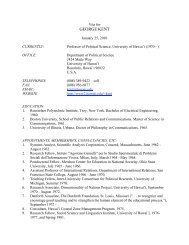
![Fall 2012 POLS 620 Syllabus [PDF] - Department of Political Science](https://img.yumpu.com/25416938/1/190x245/fall-2012-pols-620-syllabus-pdf-department-of-political-science.jpg?quality=85)
